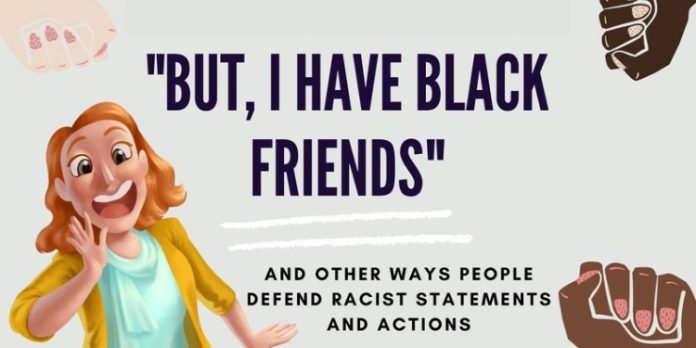Words Matter and Reveal Things
Much more research needs to be done on coded racist language. There are in your face racist words and language said by white supremacists and others, and there are the terms and phrases that are often used without a person even knowing they are making racist remarks.
Some of the phrases used include:
- “Taking down Confederate statues is erasing history,” when putting them up was erasing the truth,
- “Our founding fathers were great men,” after being told they were white supremacists and slave owners,
- “I love the way Blacks run the football and dance,” but don’t like it when they take a knee,
- “What are you doing around here?” This is said to Black joggers, walkers, and drivers in a white neighborhood.
- “We Back the Blue,” after a Black Lives Matter protest is another one, as is “All Lives Matter,” which is often said because Black lives never mattered and racists want to hide this historical fact.
Things racists say also includes: “I am color blind, I have Black friends, the Civil War was not about slavery, the 3/5th Clause had nothing to do with slavery,” and on and on. Racists get really upset when someone quotes an 1852 Frederick Douglass speech; “What, to the American slave, is your 4th of July? A day that reveals to him, more than all other days, the gross injustice and cruelty to which he is the constant victim.” Words carry hidden racist meanings. White supremacy and its language was hammered and fused into the minds of millions so that words like “master bedroom” are made neutral. Think about that one! There is the lame excuse about using the “N” word when a racist, or the culturally ignorant, say “Blacks call each other that” as if it is ok for them to use it.
Culturally ignorant people, or racists, claim that DEI and Affirmative Action is “racism in reverse.” They might go on claiming that slavery was practiced everywhere in ancient times, but never bothering to understand that slavery based on skin color is not ancient. Racists love to accuse others of “playing the race card” when they support the racist society we live in. Words matter! Words like “Cake Walk, Black List, Black Ball, Chink in the Wall, savage, spook, Sold Down the River, Black Sheep, Black Mail, Lowest on the Totem Pole, White Angels, “Eenie meenie miney mo, Catch a tiger by the toe,” (but the original version of the song used the “N-word” instead of tiger). “Fuzzy Wuzzy” was used by racist British soldiers in the 1800s to refer to the people of an East African tribe in describing the natural hair texture of non-white people in Africa. Using the word “plantation” without using the adjective “Slave” to make it “Slave Plantation” was a way to romanticize the horrid house of the slave master. This is the power of white supremacy which is now crumbling and they don’t like it. Jefferson did not believe all men were created equal – only white men were. These racist interpretations of history again line the classroom curriculum.
These phrases and words are only a small fraction of all of the racially loaded terms of hatred. The role of white supremacy is to project superiority and inferiority—with Whites supposedly superior. These are psychological projections aimed at keeping white supremacy in an endless loop to be repeated generation after generation. We have a lot of work to do in order to prevent America from being savage again. Presently, the struggle against white supremacy must take center stage.








